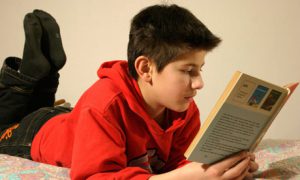
In simple terms in education we refer to “literacy skills” to mean reading and writing. We teach literacy as “language” and “literature”. The language focuses on the structure of English and the literature gives examples of how to make effective use of English.
As a society we demand certain levels of literacy. We require forms to be filled, applications to be completed, instructions to be read and notices to be observed. We need to be effective communicators vocally and via email, texts and writing. In fact social media has probably opened up more means of communication than at any other time in history. We have more occasions on which to judge a person’s literacy skills as they become more public – look at Twitter!
At Tuition First we pride ourselves on developing the literacy skills of all our students. We follow the National Curriculum, but don’t have the constraints and time pressures of a school. We help pupils practice their literacy in a private and personal environment, developing confidence along the way.
However, as a parent you can encourage literacy on an ongoing basis with surprise results for yourselves as well as your children. Read to your children from a young age. Make them interested in books and explanations. Encourage their thirst for knowledge. When reading add tone and character to your voice – have fun and enjoy your child’s response.
As the child develops their reading help them to read. If they are struggling explain, reading is like any other skill; we need to practise. We have all had to learn, praise their efforts and make time to sit with them and a book. (A story at bedtime can be a great way to relax a child before sleep). Reading should be as pleasurable for a child as sitting in front of a screen.
Encourage a child to read anything – a newspaper, a magazine, a comic, poems and rhymes, a book of short stories. Try to identify what their preferences are, ask in your local book shop or library for recommendations. Start a vocabulary book. This can be an old address book to list words alphabetically. Get your child to learn one or two new words a week and to use those words correctly in a sentence each day of the week. This will grow and embed their vocabulary.
When a child has read a book, seen a film, TV programme or even been to the theatre ask them for a review of the story line and their thoughts on the experience. Ask them open questions (who, what, when, where, why and how…..) about the experience. Encourage them to talk to their friends about what they have read or seen.
You don’t have to become a teacher. Just introduce literacy into your conversation to make it as natural as talking about football or fashion etc.
The government maybe committed to spending £13.4m on English Hubs, but every home is it’s own hub.
